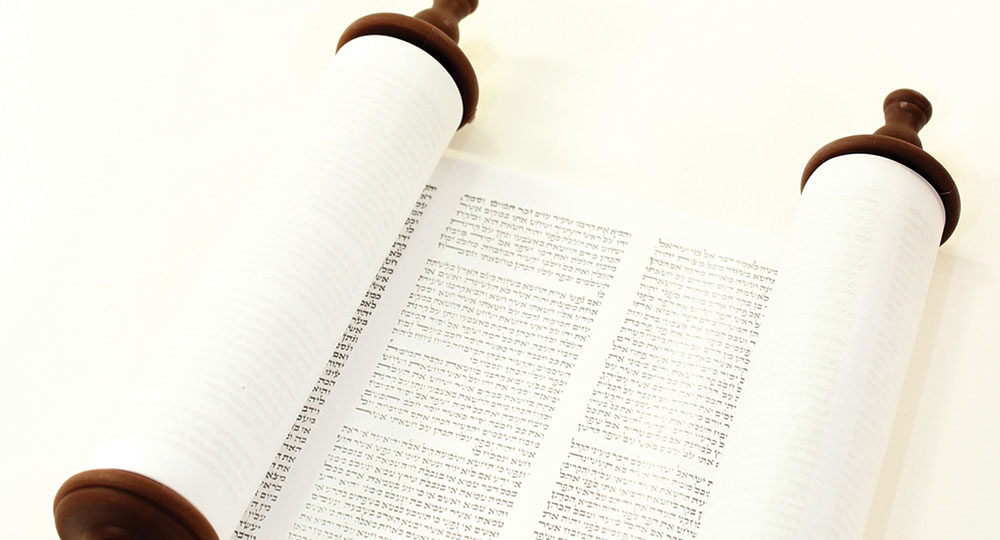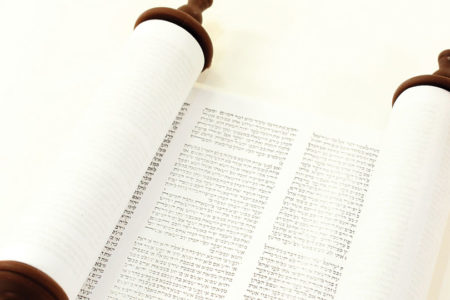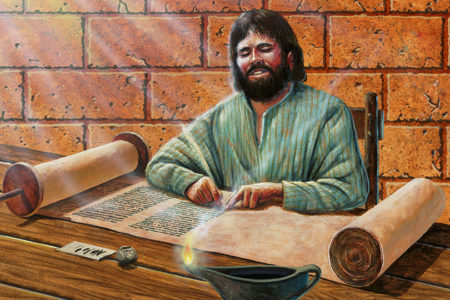Messiah in the Law
The Law is known in Hebrew as the Torah, the first of the three traditional divisions of the Hebrew Bible. The other two divisions are the Prophets and the Writings. An acronym, Tenak, composed of the first letters of the three Hebrew words for these divisions, is often used by Jewish people as a title for the Hebrew Scriptures.
Messianic prophecies are found throughout the Tenak, progressively unfolding an ever-widening portrait of the Promised One. This article examines three of the messianic promises in the Torah, or the Pentateuch, as it is also called. These three passages declare that the Messiah will be (1) the seed of the woman, (2) the Lion of Judah, and (3) the prophet like Moses.
The Seed of the Woman (Gen. 3:15)
In Genesis 3, a crucial chapter, the conflict of the ages began. After Adam and Eve disobeyed God’s command by heeding the serpent’s counsel, the Holy One pronounced judgment on each of the three participants—the serpent (vv. 14–15), the woman (v. 16), and the man (vv. 17–19). In the context of His curse on the serpent, the first promise of a messianic deliverer shines forth: “And the Lᴏʀᴅ God said unto the serpent, because thou hast done this, thou art cursed above all cattle, and above every beast of the field; upon thy belly shalt thou go, and dust shalt thou eat all the days of thy life. And I will put enmity between thee and the woman, and between thy seed and her seed; he shall bruise thy head, and thou shalt bruise his heel” (vv. 14–15).
Embedded within these ominous words of doom is mankind’s only hope—the seed of the woman, the Deliverer, the Savior, the Messiah. But before He arrived, a fierce conflict would develop. This is a promise not only of hope but also of warfare—a battle between the followers of the Lord and of Satan. Ultimately, the conflict focuses on two individuals. The word seed in Hebrew (i.e., zerah) has both a collective and an individual meaning as does its English equivalent. The singular pronoun used in the promise, “he [KJV, “it”] shall bruise thy head,” indicates that a male member of the human race will deliver a fatal blow to the serpent. This crushing blow will hot come, however, without the woman’s seed receiving a wound on His heel.
Until modern times, Jewish commentators saw a prophecy of the coming Messiah in this verse. Consider, for example, this comment from Bereshit Rabba 23, a rabbinic commentary on Genesis: “Eve had respect to that seed which is coming from another place. And who is this? This is Messiah the King.” Basically, this verse teaches that the Messiah will suffer in the process of defeating Satan. The concept of a suffering Messiah, although unfamiliar to many Jewish people, can be traced back to this ancient promise. Isaiah further developed this theme with his teaching about the suffering servant: “He was bruised for our iniquities … Yet it pleased the Lᴏʀᴅ to bruise him” (Isa. 53:5b, 10a).
Although Satan was defeated on a cross outside of Jerusalem nearly two thousand years ago, His ultimate destruction is portrayed as yet in the future, in “the lake of fire” (Rev. 20:10). It is then that his head will be bruised in the long-awaited fulfillment of Genesis 3:15.
The following basic truths can be deduced about the Messiah from Genesis 3:15. First, the Messiah will be of unique birth—He will be the seed of the woman. Although some people may have difficulty seeing the truth of the virgin birth in those words alone, it is clearly implied that the Deliverer will be of unique origin. Why else is He called the seed of the woman and not the seed of the man? Second, the Messiah will be supernatural—He will defeat Satan, a supernatural being. Only one who has power beyond that of a mere man could defeat the one who is called “the prince of the power of the air” (Eph. 2:2). Thus, the Messiah’s deity is implied. Third, the Messiah will be of the human race—from a woman, not an angel or a visitor from another world. Thus, the ultimate mystery begins to unfold: The Messiah will be both God and man, a theme later developed by the prophets (Isa. 9:6; Jer. 23:5–6; Mic. 5:2).
It must be remembered that this promise was only the first of a long series of messianic prophecies. As the revelation unfolded, more information was given and the Messiah’s credentials progressively narrowed the focus to one who would be a descendant of Shem (Gen. 9:26), Abraham (Gen. 12:3), Isaac (Gen. 26:3), Jacob (Gen. 35:11–12), Judah (Gen. 49:10), David (2 Sam 7:12–16), and Zerubbabel (Hag. 2:23) and who would be born in Bethlehem (Mic. 5:2) before the Temple was destroyed (Dan. 9:24–26; 70 A.D.). Like an inverted pyramid, this portrait of the Messiah rests on the only one who could fit these and the many other prophecies concerning Him—Jesus of Nazareth, who was born of a woman (Gal. 4:4), vanquished Satan, and sets free all those who are in Satanic bondage (Heb. 2:14–15).
The Lion of Judah (Gen. 49:10)
The dying Jacob issued his last will and testament by making prophetic statements to each of his 12 sons in Genesis 49:1–27. His fourth son, Judah, received the most precious of these prophecies. In verses 8 to 12, Judah was promised that he would be the leader of his brothers, that he would be a great conqueror, and that he would produce the future kings of Israel. The most important of Judah’s privileges, however, was that he would produce the Messiah: “The scepter shall not depart from Judah, nor a lawgiver from between his feet, until Shiloh come; and unto him shall the gathering of the people be” (Gen. 49:10). This prophecy promised that one day “Shiloh” would come, as a result of which there was an additional prophecy: “and unto him shall the gathering of the people be.”
The best interpretation of the term Shiloh views it as a personal name of the Messiah (i.e., the right of kingship will always be with Judah until the Messiah comes). To Him (the Messiah) the nations will submit. The Talmud lists Shiloh as one of the names of Messiah (Sanhedrin 98b). The most ancient Jewish commentary on the Book of Genesis also adopts this interpretation (Bereshit Rabba 99). This is the view of the Authorized Version and of many evangelical commentators. The name Shiloh is related to the word Shalom, the Hebrew word for peace. This agrees with the prophecy of the Messiah’s coming in Isaiah 9:6: “For unto us a child is born, unto us a son is given, and the government shall be upon his shoulder; and his name shall be called Wonderful, Counselor, The Mighty God, The Everlasting Father, The Prince of Peace.”
Undoubtedly, the word Shiloh refers to the King Messiah, an interpretation affirmed even by the great medieval Jewish commentator, Rashi. This prophecy is one more brush stroke in the developing portrait of the Messiah in the Old Testament Scriptures. From that time on, people looked for the Promised One to come from the tribe of Judah. Later in Israel’s history, God chose David, a descendant of Judah, to be the man through whose family the Messiah would come (2 Sam. 7:12–16). Then the genealogy was narrowed once more when a specific town within Judah, Bethlehem, was designated as the place of the Messiah’s birth (Mic. 5:2).
Anyone claiming to be the Messiah must present these messianic credentials to Israel. Jesus possessed these credentials. The genealogy in Matthew 1:1–16 qualifies Him to be the Messiah. The marvelous account of the birth of Jesus in Bethlehem recorded in Matthew 2:1–10 is in accordance with Micah 5:2. Jesus presented to Israel these and many more messianic credentials.
But someone may ask, “Could a Jewish person appear in the future who would have these same credentials and be Israel’s Messiah?” No, because there are no records available to substantiate such a claim. When the Romans destroyed Jerusalem in 70 A.D., the Temple, with all of its treasures and archives, was completely destroyed as well, including the records necessary to validate the family and tribal genealogies. Since that fateful day, no Jewish person has been able to prove by records his or her genealogy.
When I was doing graduate work at a Jewish college in Philadelphia, I was privileged to study under an Orthodox Jewish professor with a Ph.D. from Harvard University. She taught me medieval Jewish history for 30 consecutive weeks.
About halfway through the term, the subject for the weekly class was “The Messiah in Medieval Judaism.” My professor, knowing my evangelical convictions said, “Well, Mr. Varner, I guess you’ve been waiting for this week for quite a while. Let me explain one thing: In my opinion, Christianity is totally irrational and I cannot see how any thinking person can believe it.”
Since she had thrown down the gauntlet, I decided to pick it up and accept the challenge. I responded, “May I take a few minutes and share with you the reasons why I believe the Christian faith has solid reasons for its validity?” She replied, “Go right ahead,” and for the next half hour she allowed me to make my case for the messiahship of Jesus and the truth of the New Testament. I mentioned many messianic prophecies and their fulfillment in Jesus, as well as proofs for His resurrection and the validity of the New Testament.
I finished by telling her, “If Jesus is not the Messiah, then Orthodox Jews will be very disappointed, because there will not be a future Messiah for Israel.” Shocked at this, she asked what I meant by such a conclusion. I reminded her of what she already knew, that the genealogical records had been destroyed, so that no one claiming to be the Messiah today can authenticate that claim through those records. Then my learned professor answered, “Certainly somebody somewhere has kept the records.” Even though she had no idea who or where that “somebody” was, she expressed the hope that someday the records could be produced to authenticate the claims of her future Messiah. Again she remarked, “I certainly hope somebody has kept the records, because I sure want to know Him when He comes.”
I then said, “But you know that nobody has kept the records. Jesus claimed to be the Messiah before the records were destroyed. No one at that time questioned his descent from Judah and David. The only credentials He will bring with Him at His Second Coming will be the wounds He received at his First Coming” (cf. Zech. 12:10). Although she did not accept the Messiah that day, she never again called Christianity “irrational.”
If Jesus is not the fulfillment of the “Shiloh” passage in Genesis 49:10, the awful fact facing Israel is that there will never be anyone who can prove that he fulfills the prophecies of the Messiah’s royal lineage. But there is one who meets all of these qualifications—the Lion of Judah, who is also the Lamb slain to redeem Jews and Gentiles from sin’s bondage (see Rev. 5:5–10).
The Prophet Like Moses (Dt. 18:15–19)
There were three administrative offices established by God for His people Israel: the king, the priest, and the prophet. The king ruled over Israel for God; the priest represented the people before God; and the prophet spoke to the people from God. Each was anointed with oil when he assumed his office either as king (1 Sam. 16:3), priest (Ex. 28:41), or prophet (1 Ki. 19:16). Thus, each could be referred to as an “anointed one” or a “messiah” (mashiah in Hebrew) in the general sense of the term. While an individual could serve as both a priest and a prophet (e.g., Samuel), and one person might serve as both king and prophet (e.g., David), no single Israelite ever served in the dual roles of priest and king. Those who attempted to do so were judged by God (1 Sam. 13; 2 Chr. 26:16–21). Only the Messiah could serve as both priest and king (Zech. 6:12–13). The role of prophet also would belong to the Messiah, thus combining all three of these normally separate offices.
In Deuteronomy 18:15–19, Moses informed Israel that someday God would send a prophet like no other. He listed seven characteristics of this prophet: 1. He would be called by God (“The Lᴏʀᴅ thy God will raise up unto thee a Prophet,” v. 15). 2. He would be an Israelite (“from the midst of thee, of thy brethren,” v. 15). 3. He would be like Moses (“a Prophet … like unto me,” v. 15). 4. He would have the authority of a prophet (vv. 16–17). 5. He would be obeyed (“unto him ye shall hearken,” v. 15; “it shall come to pass, that whosoever will not hearken unto my words which he shall speak in my name, I will require it of him,” v. 19). 6. He would speak only God’s word (“I … will put my words in his mouth,” v. 18). 7. He would certify himself by tested prophecies (vv. 21–22).
This remarkable passage made a deep impression on the Jews of Jesus’ day. Embedded within the consciousness of the people was a conviction that someday a prophet would arrive who would be like none who had appeared before him in Israel’s history. He would be the fulfillment of Moses’ description in this passage. The expectation of this prophet extended from the priests (see their question to John the Baptist in John 1:21), to the Qumran sect (see the Dead Sea Scrolls), and down to the common people.
On two occasions in Jesus’ ministry, the crowds said of Him, “This is of a truth that prophet” (Jn. 6:14; 7:40), identifying Jesus with the one promised in Deuteronomy 18. In the infant days of the Church, both Peter (Acts 3:22–24) and Stephen (Acts 7:37) saw in Jesus’ life and ministry the fulfillment of Moses’ prophecy.
It is striking to note how Jesus fulfilled all seven of the characteristics of the prophet mentioned by Moses in Deuteronomy 18:15–19. 1. He was called by God (Lk. 9:35). 2. He was an Israelite (Mt. 1; Jn. 1:49). 3. He was a mediator like Moses (1 Tim. 2:5; Heb. 1:1, 3). 4. He spoke with an authority unlike the teachers of His day (Mt. 7:28–29; 21:10–11). 5. God declared that His words must be obeyed (Mt. 17:5). 6. He spoke the Word of God in God’s name (Jn. 12:48–49; Jn. 5:45). 7. He certified Himself by miracles and prophecies that no one could deny (Jn. 3:2; Acts 2:22; Mt. 24:2).
In Jesus, the Jewish person finds all that the Hebrew Scriptures describe as essential for life. As the anointed King, He has a kingdom in which to rule over willing subjects. As the anointed Priest, He is the sacrifice for our sins, and He intercedes for us in God’s presence. As the anointed Prophet, He is the faithful voice of divine instruction. He is Messiah—Prophet, Priest, and King in one indescribable person. Let us worship Him, adore Him, and proclaim Him to Jews and Gentiles alike, for He meets the need of our hearts for time and eternity.









Shiloh is fulfilled in another manner. It will be the location of the third temple.